- Home
- Dan Simmons
The Guiding Nose of Ulfant Banderoz Page 2
The Guiding Nose of Ulfant Banderoz Read online
Page 2
Ulfänt Banderōz was dead.
Other magicians had suspected Ulfänt Banderōz of being the oldest among them—truly the oldest magus on the Dying Earth. But for millennia stacked upon millennia, as long as any living wizard could remember and longer, Ulfänt Banderōz’s only con- tribution to their field was his maintenance of the legendary Ultimate Library and Final Compendium of Thaumaturgical Lore from the Grand Motholam and Earlier. The tens of thousands of huge, ancient books and lesser collections of magical tapestries, deep-viewers, talking discs, and other ancient media constituted the single greatest gathering of magical lore left in the lesser world of the Dying Earth. Ulfänt Banderōz allowed other magi to visit only rarely and upon his own whim, but over the countless centuries, most living wizards had visited the Ultimate Library and walked in wonder through its many corridors of shelved books.
To no avail.
There was some sort of curse or spell on every item in the Ultimate Library so that only Ulfänt Banderōz— and perhaps a few of his apprentices working there—could cull any meaning from the books and other devices. Letters shifted and scurried and melted on each page, defying translation. Verbal artifacts slurred and skipped and lapsed into frequent silences. Ancient drawings and tapestries and pictures blurred and faded even as one began to study them.
And Ulfänt Banderōz—a broad, heavy, bejowled, beady-eyed, ill-smelling ancient—would laugh at the frustrated magicians and have his servants show them out.
Shrue had gone to the Ultimate Library three times over the millennia, twice prewarned of the arbitrariness of the letters and words, and thus prepared with fixating counterspells, magical solutions, enchanted viewing lenses, and other plans, but each time the letters shifted, the sentences began and then faded away, the long, arcane written incantations and spells and numerical cabalistic formulae fled from both his eye and memory.
Ulfänt Banderōz had laughed his croaking, choking, cackle of a laugh, and Shrue had departed, defeated once again.
Some wizards had followed the easiest route and shown up secretly armed with demons and attack spells, their plan simplicity itself—kill Ulfänt Banderōz and either force his odd apprentices (all recombinated from animals and creatures from earlier Aeons) into revealing the secret of fixing the books in time, or, failing that, simply taking over the Ultimate Library until they, the wizards, could solve the puzzle in their own time.
No one ever succeeded. Ulfänt Banderōz could not be intimidated, nor could he be out-magicked in his own Library. The bones of the thousands who had been foolish enough to try such tactics had been ground into white pebbles that paved the attractive white walkway to the front door of the Ultimate Library.
But now Ulfänt Banderōz was dead. The sparling hearts revealed that the ancient magus’s body had, upon the point of death, turned to stone and was currently laid out in his bedroom high in the tallest tower of the huge stone Library keep. The heart-news also told Shrue that it was rumored that only one of the scores of apprentices had survived but that he was a prisoner inside the Ultimate Library since—immediately upon Ulfänt Banderōz’s death and turning to stone—at least a dozen terrible spell-barriers had sealed off the Library from the world around it.
Shrue the diabolist did not have to open his eyes or consult a globe or atlas to know where the Ultimate Library and Final Compendium of Thaumaturgical Lore from the Grand Motholam and Earlier lay. Ulfänt Banderōz’s library was a mere five thousand leagues southeast of Shrike’s cottage and then two leagues up Mount Moriat, high above the Dirindian River, just above the crossroads caravan city of Dirind Hopz, some two hundred leagues southwest of the southernmost limit of the Falling Wall. It was wild country, its dangers and wildness ameliorated only by the fact that Dirind Hopz lay on one of the Nine Major Caravan Routes to the holy city of Erze Damath.
Shrue opened his eyes and rubbed his long fingers and smooth palms together. He had a plan.
First he called down a Gyre from its nest of bones in his eyrie, immobilized the terrible raptor with a magical pass, and prepared a second message heart for it. The message was for Dame Derwe Coreme, formerly of the House of Domber but now War Maven of the Cillian Myrmazons. Derwe Coreme, Shrue knew, was, with her Maven Myrmazons, currently protecting and traveling with just such a caravan of pilgrims headed for Erze Damath and a mere hundred leagues north of his destination of Dirind Hopz.
The Gyre wriggled and protested as much as the inhibitory spell allowed it to. The megaraptor’s red eyes tried to burn its hatred into Shrue the diabolist. Shrue ignored it; he’d been hate-stared by better men and beasts. “Go supersonic,” he commanded as he released the Gyre and watched it flap out of the courtyard and south on its preprogrammed course.
Then Shrue touched the pulsing green gem that called in KirdriK. The bowlegged daihak shuffled and strained out of old habit, but it also listened as Shrue gave his commands.
“Go to the pasture and fetch in one of the stronger and smarter horxbrids. Lenurd will do. Then get the larger wares wagon out of the stable, harness Lenurd, and load a week’s food and wine in the back as well as eight or ten of our least valuable rugs from the vault. When you finish with that, come up to fetch my traveling chest. Oh, and carefully pour a full lentra of ossip phlogista from the vat into a container and pack it as well.”
“A lead container?” growled KirdriK.
“Unless you want to be last seen floating north over the Lesser Polar Sea,” Shrue said dryly. “And wear your robe. We’re going five thousand leagues south to a place called Dirind Hopz, beyond the Falling Wall.”
Shrue usually saw no reason in revealing his plans or reasons—or anything else—to his servants, but he knew that long before he’d first summoned the demon, KirdriK had spent an unpleasant twelve hundred years imprisoned in a cell a mile underground, and still had unpleasant associations with being buried alive; Shrue wanted the creature to prepare himself for the coming voyage.
KirdriK expelled his obligatory snarling and spitting noises and said, “You plan to drive the wares wagon five thousand leagues south, Magus-Master?”
Shrue knew that the daihak had attempted a drollery. With no roads within fifteen hundred leagues of the shores of the Lesser Polar Sea, the wagon would not make it through the sedge barrier almost within sight of the cottage. “No,” said Shrue, “I’ll be using the Constantly Expanding and Contracting Tunnel Apothegm. We shall ride in the wagon while it rides within the traveling burrow-space.”
Now KirdriK actively writhed in his effort to break the unbreakable binding spells, his massive brow, flexible snout, and many rows of teeth gnashing and rippling and flexing. Then he subsided. “Master…” began the daihak, “I humbly submit that it would be faster to jinker the large unicorn carpet, roll the wagon onto it, and fly the…”
“Silence!” said Shrue the diabolist. “This is a bad time for wizards to be arriving anywhere by jinkered anything. Prepare the horxbrid and wagon, fetch my trunk, dress yourself in the dark blue Firschnian monk robes, and meet me on the lawn in forty-five minutes. We depart this very afternoon.”
· · ·
The last few leagues rumbling along with the pilgrims’ caravan were much more pleasant—even for Shrue—than the hours spent hurtling underground through rock and magma. KirdriK had been commanded to silence once above ground, but for these last miles and leagues he expressed his dissatisfaction by hissing and belching at every opportunity.
In happier days, such a caravan passing through hostile lands—the primary assailants here were wind-stick wraiths, rock goblins, and human bandits—would have been protected by a minor wizard utilizing his various protective spells in exchange for pay. But since the rise of murderous prejudice against the magi, the pilgrims to holy shrines, merchants, and other caravaners had to make do with mercenary soldiers. The leader of this band of eighteen Myrmazon mercenaries was War Maven Dame Derwe Coreme.
Derwe Coreme and Shrue the diabolist had known each other for a bilbo tree�
�s age, but the magician’s true identity was safe with the woman warrior. It’s true that she laughed out loud when she first abandoned her megilla to ride in Shrue’s canvas-covered wagon; the diabolist sat at the reins shrouded in a common merchant’s shapeless tan robes, his lined and almost frighteningly saturnine face largely hidden by the shadows thrown by his soft-crowned, wide- and floppy-brimmed green-velvet Azenomei-Guild rugseller’s hat. The two chatted comfortably as Shrue’s wood-wheeled wagon rolled along in the rear of a caravan of more than forty similar wagons while KirdriK hawked, spat, and hissed in the rear amongst the carpets and Derwe Coreme’s fanged and clawed two-legged megilla bounded alongside in a state of extreme reptilian agitation at the scent of the daihak.
Dame War Maven Derwe Coreme’s past was shadowy and largely lost to legend, but Shrue knew that once this beautiful but scarred elder warrior had been a soft, innocent and sullen girl, as well as a largely useless princess fifth in line to the throne of Cil’s now-defunct House of Domber. Then one day a thief and a vagabond sent on a useless odyssey imposed as punishment by Iucounu the Laughing Magician had kidnapped young Derwe Coreme, despoiled her for his pleasure, and eventually traded her to a small band of the vile sump-swamp river Busiacoes in exchange for travel advice of very dubious value. The Busiacoes had used her roughly for more than a year. Eventually, her character and heart hardening like tempered steel, Derwe Coreme killed the six Busiacoes who’d kept her as a pleasure slave, wandered the swamp Wegs and Mountains of Magnatz for several years with a barbarian warrior named Conawrd (learning more about blade-and-spear warfare than any former princess in the history of the Dying Earth and, many say, more than the dull-witted Conawrd himself), and then struck out on her own to earn a living as a mercenary while wreaking her revenge on all those who had ever slighted her. The thief and vagabond who had first abducted her—although Derwe Coreme by this time considered that abduction a boon—was eventually tracked down in Almery. Although Derwe Coreme had originally planned for the splayfooted lout to suffer indignities that no male of any species would wish to contemplate, much less experience, she eventually contrived for him to escape with all of his members and appendages intact. (He had not been very good, but he had—after all—been her first. And far more than her parents or early palace tutors, his particular brand of selfish indifference had helped make Derwe Coreme what she was today.)
In recent decades, Dame War Maven Derwe Coreme had personally trained and hired out her Three Hundred Myrmazons—women warriors each with a story and attitude as ferocious as their leader’s—for lucrative mercenary work. For this caravan duty, eighteen Myrmazons had come along (although four or five would have sufficed for the few hundred wind-stick wraiths, rock goblins, and human bandits waiting to waylay this caravan) and each young woman warrior was megilla-mounted and dressed in skintight dragonscale armor that left her left breast bare. Even the Myrmazons’ adversaries—in their last seconds of life—found this ritual form of dress distracting.
As they chatted, Derwe Coreme laughed and said, “You are as droll and witty and private as ever, Shrue. I’ve often wondered what might have been our relationship if you’d been younger and I’d been more kindly disposed toward the male of our species.”
“I’ve often wondered what our relationship might have been had you been older and I had been a female of our species,” said Shrue the diabolist.
“You have the magic,” laughed War Maven Derwe Coreme. “Make it so!” And with that she whistled shrilly, her megilla ran up alongside the wagon and lowered its scaly neck, and she leaped across to the saddle and spurred the beast away.
· · ·
The caravan town of Dirind Hopz was overflowing with displaced pilgrims, merchants, and wayfarers. Bandit activity and general mayhem were so rampant in all directions south that even the most pious worshipers bound for Erze Damath found themselves halted in Dirind Hopz until private armies could clear the roads. There was a huge temporary encampment on the plains just to the northeast of the town and most of the pilgrims in Shrue’s caravan camped there, living in their wagons, and Derwe Coreme and her Myrmazons set up their own city of tall red tents. Shrue, however, in his guise as rugseller—and because he wanted to get as close as he could to the mountain along the river that had the Ultimate Library and Final Compendium at its summit—brought KirdriK and sought out an inn.
All the finer establishments were on the bluffs high above the Dirindian River, where they received cool breezes, offered expansive views, and kept their distance from the many sewers that opened into the Dirindian; but all the finer establishments were full. Shrue finally found a tiny room and tinier cot up under the eaves in the ancient, leaning, ramshackle Inn of the Six Blue Lanterns but had to pay an outrageous twenty terces for it.
Schmoltz, the one-eyed innkeeper whose forearms were thicker than Shrue’s thighs, nodded at KirdriK and said, “An extra twelve terces if your monk sleeps on the floor or stands in the room while you sleep.”
“Followers of the Firschnian Eye seek only mortification and physical discomfort,” said Shrue. “The monk, who never sleeps, shall be satisfied to take shelter in your barn amidst the dung heaps and foul-smelling brids and mermelants.”
“That’ll be ten terces for use of the barn,” growled Schmoltz.
After securing KirdriK in the barn, Shrue went up to his room and set one of his own rugs on the floor—it filled the small space between the bed and the wall—and then laid his own clean sheets and blankets on the dubious cot, burning the old ones in a flameless blue vortex. Then the diabolist went down to the common room to eat his late dinner. Rug merchants of Azenomei Guild never removed their hats in public, so Shrue felt moderately comfortable with his disguise under the low-hanging velvet brim, silk straps, half-veil, and floppy ear coverings.
He’d finished only half of his stew and drained just one glass from his flagon of indifferent Blue Ruin when a short, balding man slipped into the empty chair opposite him and said, “I beg your pardon for the intrusion, but do I not find myself in the company of Shrue the diabolist?”
“You do not,” murmured Shrue, touching his mer- chant’s hat with his bony fingers. “Surely you recognize the sign of the Azenomei Guild?”
“Ahh, yes,” said the short, heavy, beady-eyed man. “But I apologize for any effrontery if I add that I also recognize the long, strong features of an arch-magus named Shrue. I had the pleasure of seeing the famous diabolist long ago in a thaumaturgical wares-fair in Almery.”
“You are mistaken,” said Shrue with an inaudible sigh. “I am Disko Fernschüm, rugseller and calendar-tapestry menologist from Septh Shrimunq in Province Wunk in south Ascolais.”
“My mistake then,” said Faucelme, “but please allow me to explain to the honorable merchant Disko Fernschüm the pressing business that I, Faucelme, would have had with the magician named Shrue. It will, I promise, be worth your while, sir.” And Faucelme signaled the serving person, Schmoltz’s ample-bosomed young wife, over to order a better flagon of wine.
Shrue knew of Faucelme, although the two had never conversed nor been introduced. Faucelme lived a life of some obscurity in the forest-wastes far north of Port Perdusz, living in a modest (for a magus) manse and pretending to be a most minor magician, all the while terrorizing his entire region, murdering and robbing wayfarers, and slowly building his magical powers through the acquisition of curios and talismans. The man himself looked harmless enough—short, bald, stooped, with a nose like a Gyre’s hooked beak and tiny, close-set eyes. A fringe of unkempt gray hair straggled down over Faucelme’s equally hairy ears. The old magician wore a black velvet suit, shiny and thin with age, and only the rich rings he sported on every finger gave any sense of his wealth and mendacity.
“You see,” said Faucelme, pouring Shrue a fresh goblet of Schmoltz’s best red, “just to the southeast of this weary—and smelly!—little caravan town, upon the summit of Mount Moriat, there lies the Ultimate Library of…”
“What
has this to do with me?” interrupted Shrue. He’d gone back to drinking his lesser Blue Ruin. “Does the library need rugs?”
Faucelme showed ancient yellow teeth in a rodent’s smile. “You and I are not the first wizards here since Ulfänt Banderōz’s death,” hissed the little guest-killer. “At least a score have left their carcasses on Mount Moriat’s summit, just outside the spell-shield wall the master of the Library left behind.”
Shrue radiated indifference and ate his stew.
“Ulfänt Banderōz left a dozen layers of defense,” whispered Faucelme. “There is a Layer of Excruciating Breathlessness. Another Layer of Internal Conflagration. Then an inert layer, but one stocked with starving stone-ghouls and vampire necrophages. Then a Layer of Total Forgetfulness to the Defiler, followed by…”
“You mistake me for another,” said Shrue. “You mistake my silence at your boorishness for interest.”
Faucelme flushed and Shrue saw the hatred in the old magus’s eyes, but the killer’s expression slid back into a simulacrum of generous friendship. “Surely, Shrue the diabolist, it would be better—and wiser and safer—for the two of us to pool our resources…mine infinitely more modest than yours, of course, but surely stronger in combination than in separate attempts—as we both try to pass through the Twelve Defensive Layers after the dawn…”
“Why wait for morning if you are so eager?” asked Shrue.
Real fear flickered across Faucelme’s features. “Mount Moriat is renowned for its ghouls, goblins, ghosts, wolves, and albino Deodands, even outside of Ulfänt Banderōz’s magical defenses. And you can hear the storm pounding upon the inn’s shingles even as we…”

 The Terror
The Terror Endymion
Endymion Hyperion
Hyperion The Crook Factory
The Crook Factory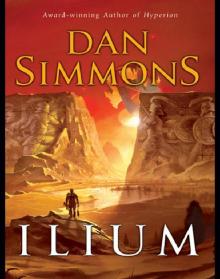 Ilium
Ilium Phases of Gravity
Phases of Gravity Hardcase
Hardcase Fires of Eden
Fires of Eden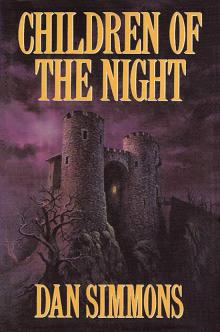 Children of the Night
Children of the Night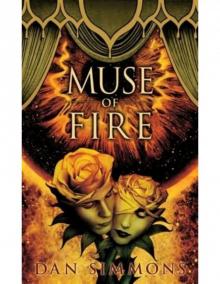 Muse of Fire
Muse of Fire Drood
Drood The Fifth Heart
The Fifth Heart Carrion Comfort
Carrion Comfort The Hollow Man
The Hollow Man Summer of Night
Summer of Night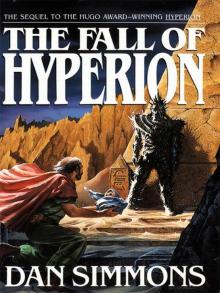 The Fall of Hyperion
The Fall of Hyperion Black Hills
Black Hills A Winter Haunting
A Winter Haunting Hard Freeze
Hard Freeze Prayers to Broken Stones
Prayers to Broken Stones Hard as Nails
Hard as Nails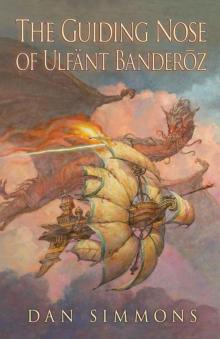 The Guiding Nose of Ulfant Banderoz
The Guiding Nose of Ulfant Banderoz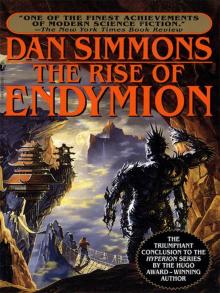 The Rise of Endymion
The Rise of Endymion Orphans of the Helix
Orphans of the Helix Lovedeath
Lovedeath Olympos
Olympos Darwin's Blade
Darwin's Blade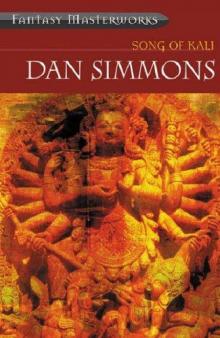 Song of Kali
Song of Kali Worlds Enough & Time: Five Tales of Speculative Fiction
Worlds Enough & Time: Five Tales of Speculative Fiction The Abominable
The Abominable The Death of the Centaur
The Death of the Centaur Hard as Nails jk-3
Hard as Nails jk-3 Worlds Enough & Time
Worlds Enough & Time Joe Kurtz Omnibus
Joe Kurtz Omnibus The Hyperion Cantos 4-Book Bundle
The Hyperion Cantos 4-Book Bundle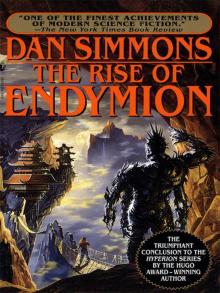 Rise of Endymion
Rise of Endymion Hard Freeze jk-2
Hard Freeze jk-2 Olympos t-2
Olympos t-2 The Abominable: A Novel
The Abominable: A Novel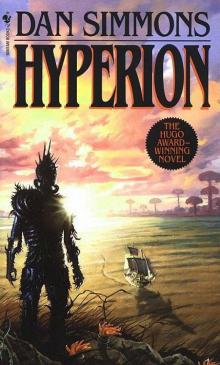 Hyperion h-1
Hyperion h-1 Remembering Siri
Remembering Siri Black Hills: A Novel
Black Hills: A Novel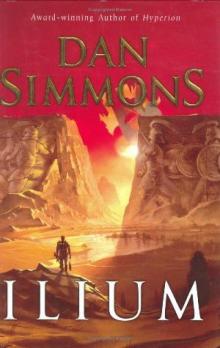 Ilium t-1
Ilium t-1 Hardcase jk-1
Hardcase jk-1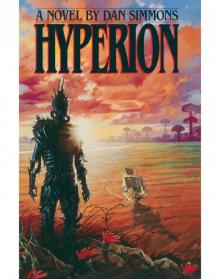 Hyperion 01 - Hyperion
Hyperion 01 - Hyperion